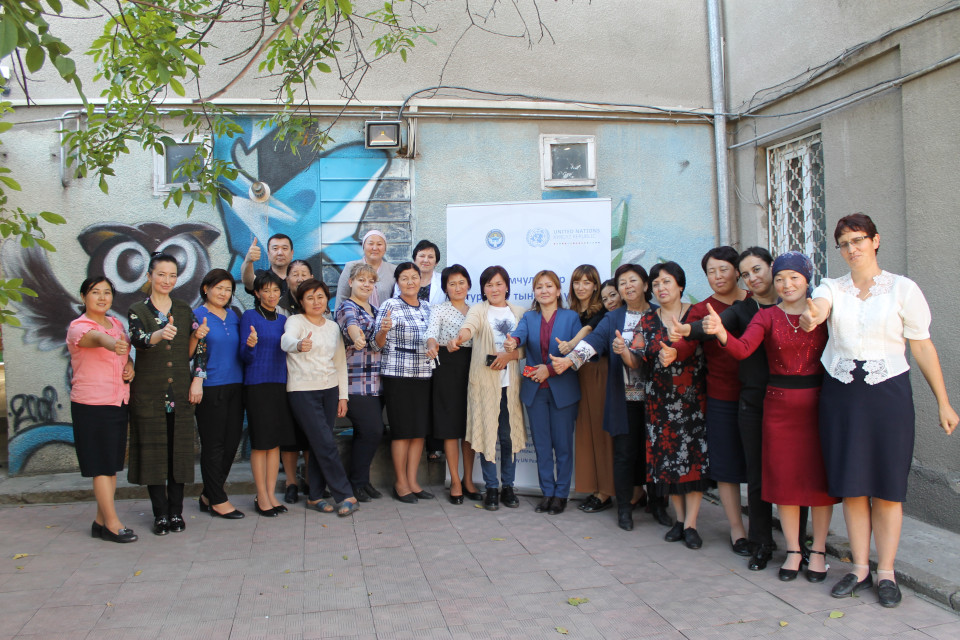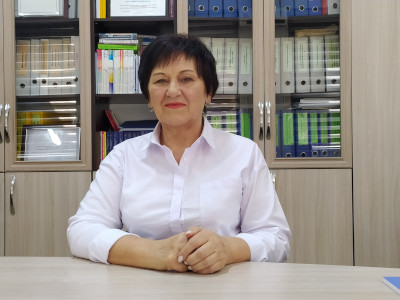Removing gender stereotypes from education in Kyrgyzstan
What children learn at school shapes the way they think about gender and societies’ social and cultural norms. In Kyrgyzstan, a partnership between the Government and UN agencies recently trained 50 teachers and piloted new teaching methods, also available online through an e-learning platform, to help remove gender stereotypes from the education system. The Republican Institute of Teacher Training (RITT) endorsed the new courses and included them in the registry of teacher training programmes.Date:

UN Women, the Foundation for Educational Initiatives Support and the Ministry of Education and Science of Kyrgyzstan conducted this gender-sensitive education effort as part of the Communities for Sustainable Peace project, supported by the UN Peacebuilding Fund.
“Eliminating gender stereotypes in teaching materials and programs, and redefining gender-responsive teaching methods is necessary to promote non-discriminatory roles and practices in schools,” says Ulziisuren Jamsran, UN Women Country Office Representative in Kyrgyzstan.
Tatiana Romanova, a school teacher from Bishkek, was one of the 50 teachers who participated in the trainings and subsequent piloting of the teaching methodology, focused on gender equality and non-discrimination in school education.
After the trainings and mentoring sessions, she and other teachers have started applying teaching methods aimed at fostering values on diversity, social inclusion, non-discrimination and gender equality among school students. Participating teachers were especially interested in the analysis of modern history textbooks. During the training, an impartial assessment of these textbooks based on clear and understandable indicators allowed them to see these materials through a gender lens for the first time, exploring such questions as: why do some textbooks use more images of men than women.

After the training course and back in the classroom, the participating teachers assessed the reactions of their students to their new methods.
“During the lessons, children were actively involved in discussions on various issues. The students were very interested in ways to protect their rights and attitude towards children with disabilities. They showed full interest in supporting these children,” says Romanova. “They were very worried about family issues, including gender equality in the family, especially the attitudes and perception to traditional marriages and bride kidnapping practices. This is the process of forming a civic position,” she says.
Also as part of the efforts, 1,338 girls and 1,169 boys studying in grades 7-11 learned to critically comprehend information, express their opinion about prevailing stereotypes regarding the social roles of men and women, and offered their own ways on how to change these. More than 150 school-wide events were held. These explored discriminatory practices against women and girls, ways to prevent violence at school and in the family.
The teachers shared some of the comments from their students who attended the events. For example, Altynai Duishonova, from the 9th grade said: “I learned that gender equality is not only about equal rights between men and women, gender equality should be between people of different races, nationalities and other large social groups.”
And, Salokhidin Narmuzaev, from the 8th grade said: “I used to think that gender equality is about protecting women's health and safety. After the lessons I realized that women and men have equal rights and opportunities; that some of our social views are stereotypical, we can change them by increasing our level of knowledge.”
As part of this effort, the Ministry of Education and Science assessed 50 secondary school textbooks. “Unfortunately, the results highlighted a problem: none of the textbooks received a ‘fully consistent’ rating,” said Almazbek Toktomametov, president of the Kyrgyz Academy of Education. “This means that authors need to learn how to create textbooks that meet modern requirements, and teachers need to make up for the shortcomings of existing textbooks. The solution to this problem is facilitated by the electronic resource Gender Equality and Non-Discrimination in School Education, which answers the main questions: what is equality, social inclusion, diversity, and how to form these values in students,” he says.
The project supported development of an electronic educational platform “Gender Equality and Non-Discrimination” in both Kyrgyz and Russian languages and conducted orientation training on using the online module by the staff of the teacher training institutions of the Kyrgyz Republic. The module is accessible via https://book.iuk.edu.kg/ru and was included as 72-hour obligatory course within the professional training program for the teachers of “History” and “Human and Society” courses, and 8-hour course for the teachers of the other specialization areas on the basis of the Republican Institute of Teacher Training (RITT) programmes.
The Communities for Sustainable Peace project is implemented by UN Women, UNICEF and UNFPA in partnership with the Government and civil society organizations. These activities contribute to achieving Sustainable Development Goal 4, to ensure inclusive and equitable quality education, and Goal 5 to achieve gender equality and empower all women and girls.